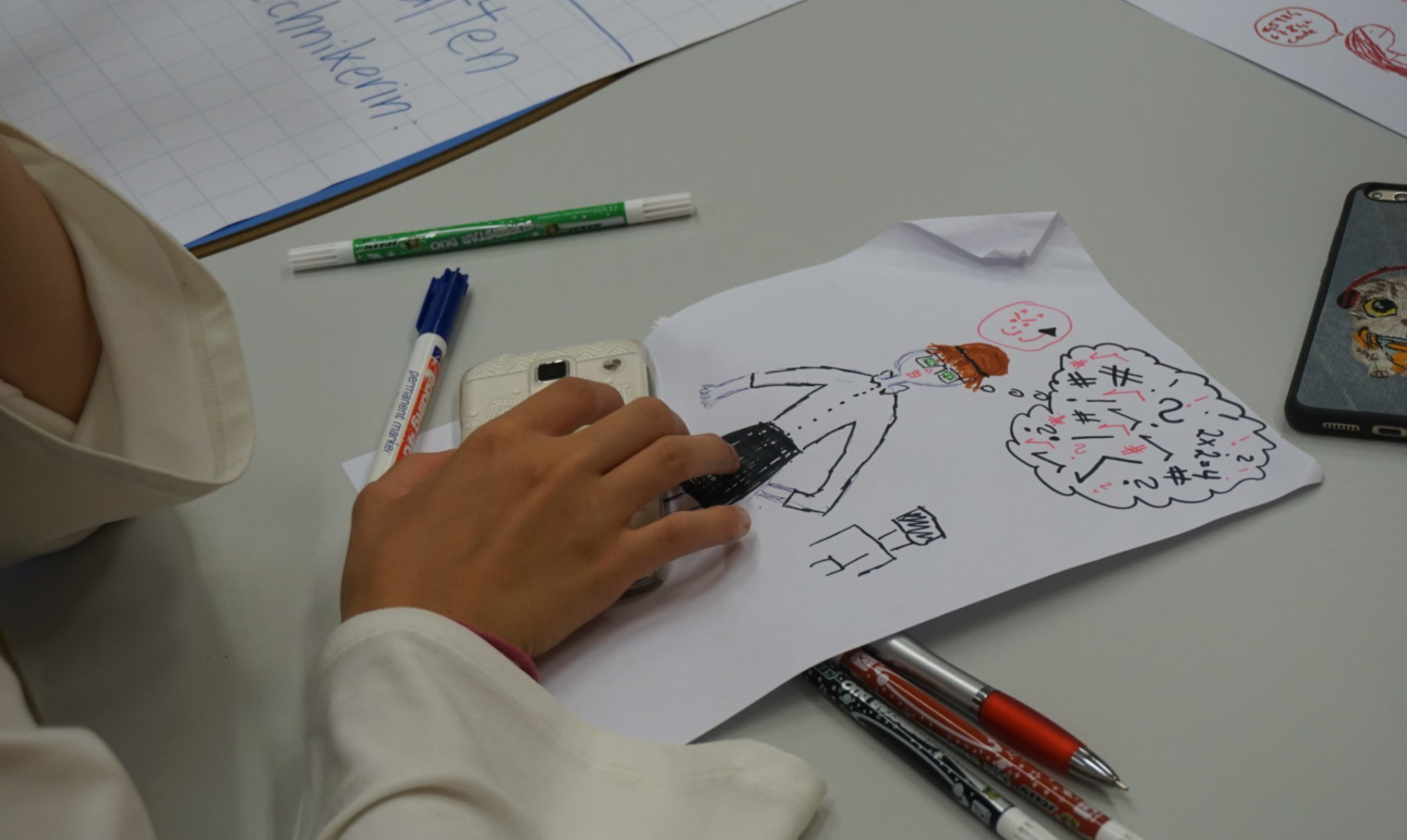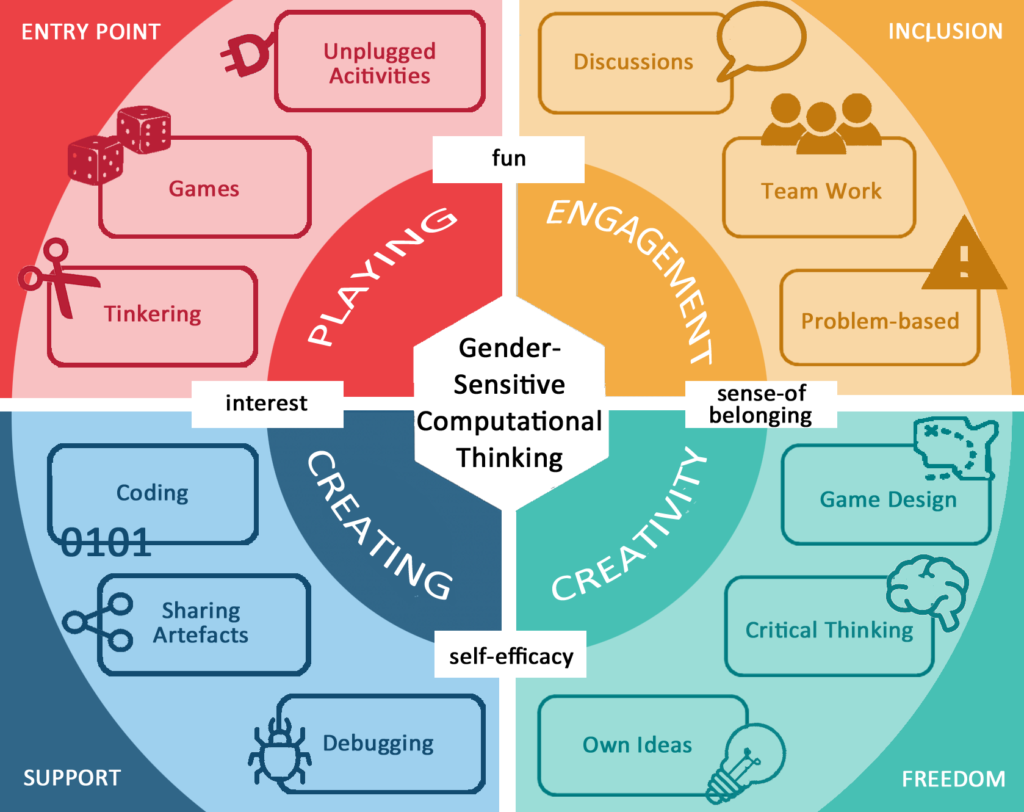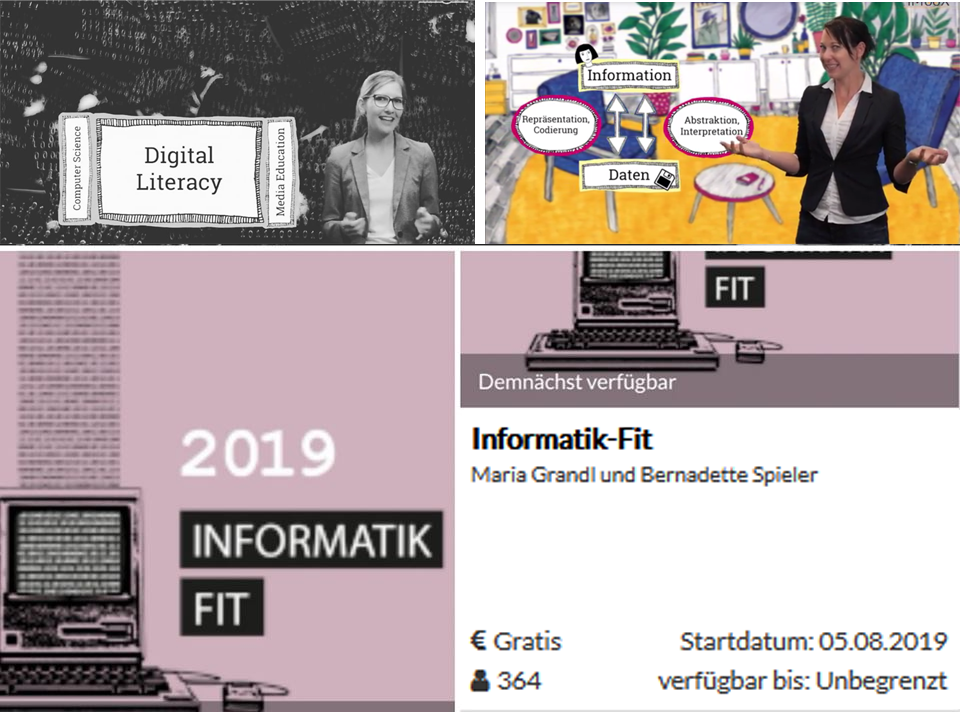IMPACT+ Informative Mini-Games for Programming Concepts and Computational Thinking
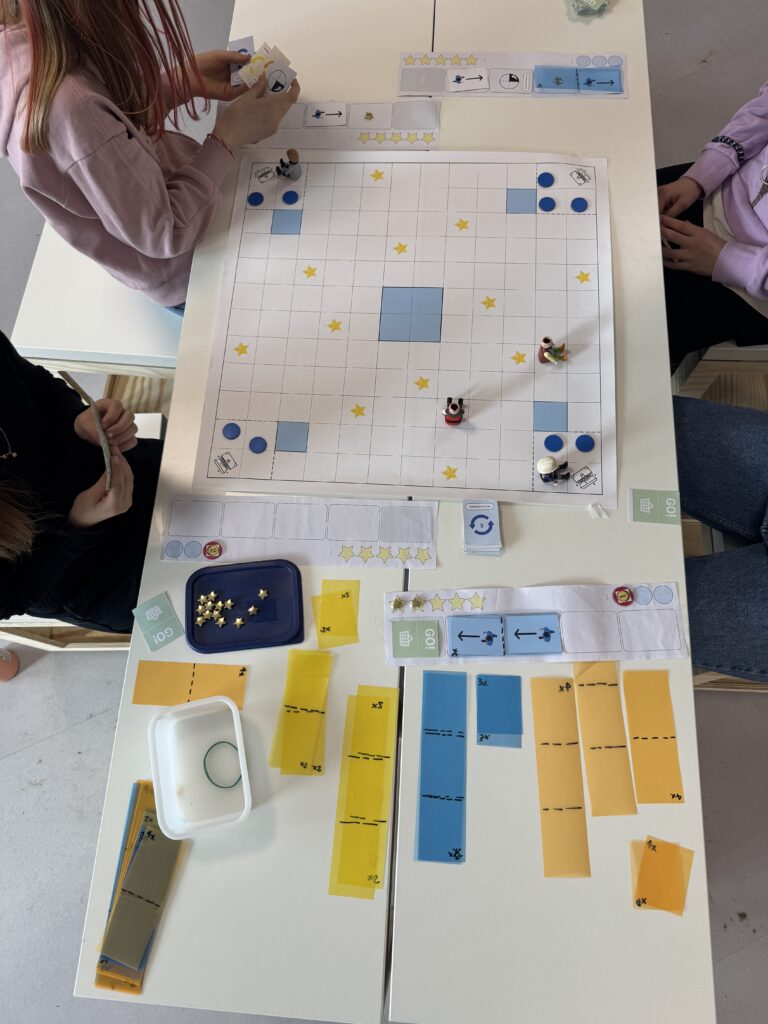
09.2025 – 08.2026
https://phzh.ch/en/about-phzh/topics-and-activities/projects/impact/
funded by Haslerstiftung
together with inlusio
continuation of IMPACT
Summary: IMPACT+ is a board game for 3rd and 4th graders that teaches core programming concepts in a playful way. In this second project phase, the analog version will be extended with a digital story and teacher materials for classroom use.
Background and Motivation
In the Swiss primary curriculum, core programming concepts are typically introduced only in grade 5. However, this introduction often assumes prior knowledge and skills that students have not yet developed. While younger learners in grades 1 and 2 engage with logical thinking tasks like sorting and following instructions, fundamental concepts such as sequences, loops, conditions, and events are frequently missing from early learning experiences.
This lack of early exposure can result in low confidence, cognitive overload, and limited motivation when students encounter programming tools for the first time. Addressing this gap requires age-appropriate, engaging, and low-threshold resources that introduce programming concepts in a playful and meaningful way.
The IMPACT+ project builds on the success of a first development phase, which took place between June and December 2024. A fully unplugged, analog board game was developed to introduce key programming concepts to 3rd and 4th graders in a playful and story-based format. The development followed an Educational Design Research (EDR) methodology and included a structured literature review, consultations with didactic experts, and iterative classroom testing. The prototype was implemented in eight 4th-grade classrooms with a total of 161 students. The preliminary evaluation showed strong engagement, high age-appropriateness, and clear potential for fostering programming-related skills. The results of this first phase are publicly accessible in the interim project report and further described on the PH Zürich project site:
ComeThinkAgain: COMputational and Entrepreneurship THINKing And Green Agenda INovations
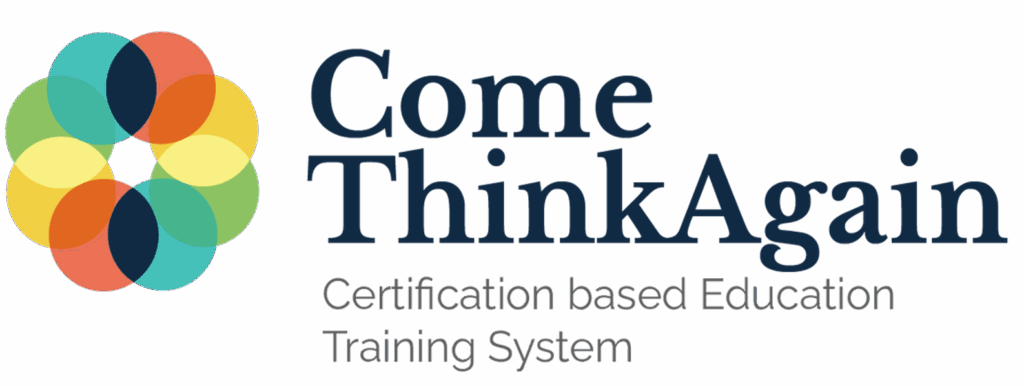
04.2024 – 03.2027
https://erasmus-plus.ec.europa.eu/projects/search/details/101139845
Erasmus+ Programme
Key Action: Partnerships for cooperation and exchanges of practices
Action Type: Alliances for Education and Enterprises
EU Grant: 1.199.996,00 €
PHZH: Associated Partner co-funded by Movetia
Summary: omputational thinking, problem-solving skills, as well as social, green and personal skills are becoming increasingly important. As a result, the focus in education is transitioning away from imparting knowledge and more towards enabling independent, reflective, and cooperative competence acquisition. Education in a culture of digitality ensures the participation of all learners with different prerequisites and equal opportunities. Facing these challenges, the proposed project focuses on the development, implementation and evaluation of a cross-sectoral, standardised training and certification system based on the pillars of Computational and Entrepreneurial Thinking, as well as Sustainable Future and Green Skills. This will contribute efficiently to the achievement of future knowledge developments across Europe in vocational and higher education. The final outcome of the project will be a micro-Certification based Education Training System called “ComeThinkAgain CETS,” offering micro-modules for both vocational and higher education at a European level. Since teachers and trainers are multipliers for current jobs in the industry and the future workforce, the main target groups of the project are teachers trained at Higher Education (HE) level at Universities of Teacher Education and Vocational Education Training (VET) trainers with focus on ICT professions as well as on certain industry sectors, such as manufacturing or production. The learning materials produced will be published as Open Educational Resources (OER) under an open Creative Commons (CC-by) licence. The approach of providing an internationally accepted and standardised certification is inspired by the European Computer Driving Licence ECDL; (ICDL, 2022). Evidence of the efficacy of this approach is provided by experimental pilot implementations in the project partners’ countries in the form of teacher training at higher education and vocational training institutions.
Related Publications:
Bernadette Spieler, Melanie Kieber, Julia Lanz, Harald Burgsteiner, Sandra Tomeschek, Martin Kandlhofer, Luciana Ayciriex, Karl Kruusamae (2025)Constructionism as a Key to Interdisciplinary Competences: Combining Computational Thinking, Entrepreneurship, and Green Skills. Constructionism Conference Proceedings, 8, 249–260. DOI: 10.21240/constr/2025/70.X
Burgsteiner, H., Spieler, B., Kandlhofer, M., & Bieber, R. (2024)ComeThinkAgain – Computational and Entrepreneurship Thinking and Green Agenda Innovations. In: Proceedings of the 1st International Conference on Digital Skills and IT Professionalism (pp. 68–69). DOI: 10.5281/zenodo.14194730
Kandlhofer, M., Spieler, B., & Burgsteiner, H. (2024)Von Algorithmen zu Öko-Innovationen: Computational Thinking, Entrepreneurship, Green Skills. In: Gesellschaft für Informatik e.V. (GI) (Hrsg.), Jahresbericht 2024 (S. 54).
Bernadette Spieler (2024)Computational Thinking: Synergien mit Entrepreneurship und Green Skills. OCG Journal: ZukunftsCode, 48(4), 5–7. https://www.yumpu.com/de/document/read/69160861/ocg-journal-zukunftscode
Digital Storytelling with plants – Multimedia engagement with young people in the Botanical Garden
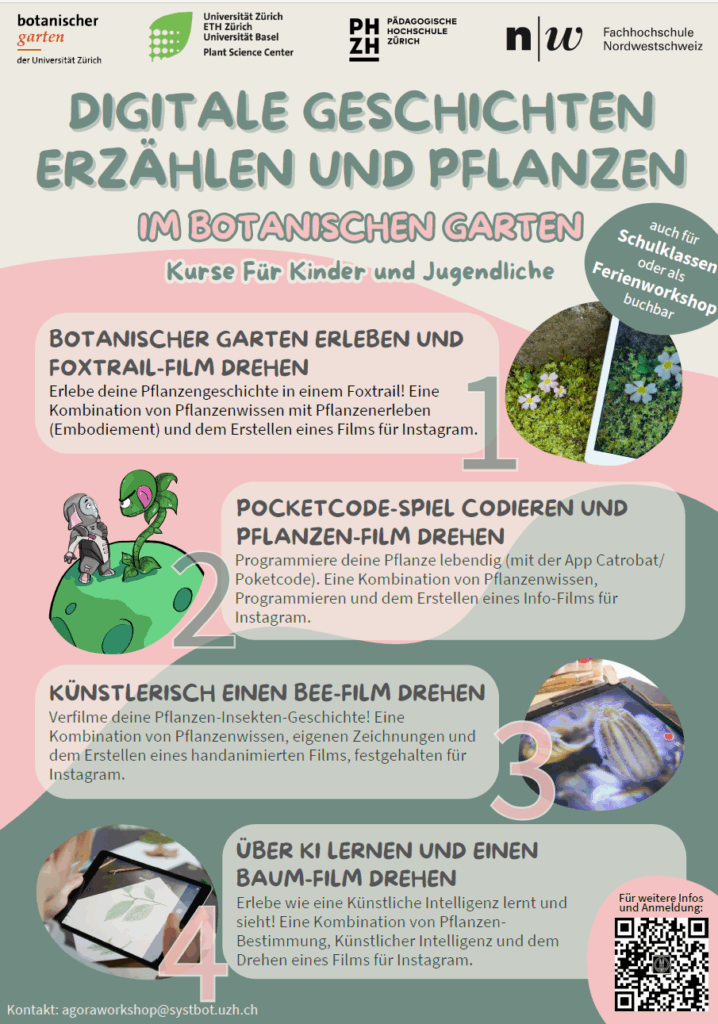
01.06.2023 – 31.10.2025
https://data.snf.ch/grants/grant/215783
AGORA science communicatin project, 2023-2025
Together with
- Institute of Systematic Botany and Botanical Garden
- University of Zurich / Institute of Plant and Microbiology / Department of Geoography and Chemistry
- University of Applied Sciences Northwestern Switzerland / Institute of Aesthetic Practice and Theory
- Zurich-Basel Plant Science Center
- Zurich University of Education
Goal: This project will use the knowledge and skills of scientists and gardeners at the Botanical Garden of the University of Zurich, artists, and digital and pedagogical experts to co-create contemporary stories about plants and our human relationship to them, with participants from different cultural backgrounds, thus enhancing plant knowledge.
Related Publications:
Manuela Dahinden, Yvonne Steinbach, Caroline Weckerle, Bernadette Spieler (2025)Nature-based Constructionism: Using Digital Storytelling to Increase Computational Skills and Plant Awareness. Constructionism Conference Proceedings, 8, 539–542. DOI: 10.21240/constr/2025/113.X
IMPACT: : Informative Mini-Games for Programming Concepts and Computational Thinking
Game design as a teaching method
06.2024 – 12.2025
https://phzh.ch/en/about-phzh/topics-and-activities/projects/game-design-as-a-teaching-method/
The project’s aim is to develop a series of unplugged mini-games that teach programming concepts such as loops or variables to develop the problem-solving skills of fourth-graders through creative challenges.
Description: In this project, a series of unplugged mini-games (approx. 5-6 mini-games) covering different programming concepts and computational thinking (CT) will be developed. Each mini-game will focus on a specific concept such as loops, conditions or variables, encouraging children’s problem-solving skills through creative challenges. The project will be tested in close collaboration with Year 4 children to ensure that the games meet their needs and abilities. This game can be used, for example, as a supplement to or preparation for a coding course to introduce different concepts in a playful way.
There is a clear gap in the 3rd and 4th grade curriculum that does not adequately cover the understanding of basic programming concepts and Computational Thinking (CT). This leads to children entering Year 5 without the necessary prior knowledge, where programming and coding concepts are usually introduced for the first time. his project aims to close this gap by creating an unplugged, playful learning environment that introduces 4th grade children to the essential concepts of programming in an age-appropriate and motivating way.
Related Publications:
- Trütsch, J., Meyer-Baron, L., & Spieler, B. (2025)IMPACT: Informative Mini-Games for Programmingconcepts and Computational Thinking. Entwicklung eines Unplugged-Programmierspiels für die 4. Klasse. Zwischenbericht. DOI: 10.5281/zenodo.15230186
Larissa Meyer-Baron, Janine Truetsch, Bernadette Spieler (2025)From Play to Code: Preparing Young Learners for Coding with an Unplugged Board Game. Grade 4. Constructionism Conference Proceedings, 8, 595–596. DOI: 10.21240/constr/2025/103.X
FLAMES: Foreign Languages and Machine Learning in Schools
Research and development project for foreign language teaching with AI in cycle 3
In progress (1.10.2024–31.8.2026)
The aim of the project is to investigate how artificial intelligence (AI) can be meaningfully applied in foreign language teaching to provide targeted support for teachers and students. The focus is on the needs of teachers, who are to receive practical training and innovative teaching materials. The project develops concrete scenarios that are tested and evaluated in close collaboration with teachers. The aim is to create a practical approach that optimizes both the planning and implementation of teaching and the learning processes of students.
One focus is on supporting language teachers with AI tools. Tools can be used, for example, to create sample texts, provide differentiated practice materials, or provide personalized feedback and automated assessment. At the same time, the project is investigating how students can use AI tools independently as learning tools, e.g., to support writing processes, research work, or through personalized feedback.
The project is designed to encourage critical reflection. Teachers and students should go beyond simply learning to use the tools; they should also gain an understanding of how these tools function, evaluate their potential applications in various learning contexts, and critically assess their limitations from both scientific and practical perspectives. To support this, targeted workshops and teaching units are being developed, aiming to foster both practical implementation skills and foundational knowledge about AI.
Game Changers for Change Agents - Sustainable Development Goals in Dialogue (ChaCha)
01.09.2022 – 31.08.2025
AGORA science communication project, 2022 – 2024
Link: https://data.snf.ch/grants/grant/208381
Goal: to break down cutting-edge research on transformation for Sustainable Development so as to make it actionable with high school and vocational school students in Switzerland
Project partners: Centre for Development and Environment (CDE) / University of Bern, PHZH (Co-Investigator), GameLab (ZHdK), Education21, SeC
Informatikausbildung an den PHs
en: Informatics Education at the Universities of Teacher Education (Switzerland)
2022-2023
This project a research project that aims to investigate and evaluate the current state of computer science education in primary and secondary level at Universities of Teacher Education in the German-speaking part of Switzerland. The project is conducted by administering surveys and interviews with instructors involved in computer science education. The data collected will be analyzed and used to identify areas of improvement and best practices.
The findings of the study will be presented at an event at Schloss Au/Zurich (3.4.2023) and published as a white paper. The goal of the project is to provide valuable insights and recommendations for the development and implementation of computer science education in the German-speaking part of Switzerland.
Related Publications:
- Meyer-Baron, Larissa, Adrian Degonda, Bernadette Spieler u. Thomas Schmalfeldt (2024)Vergleich der Informatikausbildung für angehende Primar- und Sekundarlehrpersonen an Deutschschweizer Pädagogischen Hochschulen. Zürich: Pädagogische Hochschule Zürich DOI: 10.5281/zenodo.11468166
Making at School
01.09.2021 – 31.08.2023
Making in School – School-related creation and testing of OER modules for Making in the classroom
DiZH-Innovationprogramm Project Call
Consortium
- Centre of Mediaeducation and Informatics, Zurich University of Teacher Education
- Department of Plant and Microbial Biology, University of Zurich
- School office, City of Zurich
Start date: October 2021
Duration: 2 years
Project-Webpage: https://explore-making.ch
Contributions (in German):
- Interview PHZH News, Akzente Heft and Blog – Beitrag: “Teilhabe in der digitalen Gesellschaft” (German)
- Werkspuren, Heft 2/2022, Nummer 166, S. 61, Making im Unterricht Link/PDF sowie Heft 3/2022, Nummer 167, S. 50-51. Textiles Gestalten im Sinne der Maker Education MUSTER UND E-TEXTILIEN (Link)
- Akzente Heft und Blog – Beitrag: “Im Unterricht basteln, tüfteln, erforschen – analog und digital”
- Alle Weiterbildungen/Veranstaltungen rund um Making: https://phzh.ch/making
Related Publications:
Bernadette Spieler, Manuela Dahinden, Klaus Rummler und Tobias M. Schifferle (2024)Heft 56: Making & more: gemeinsam Lernen gestalten. DOI: 10.21240/mpaed/56.X
Spieler, Bernadette, Tobias M. Schifferle, und Manuela Dahinden (2024)«Making im Unterricht» Erfahrungen von Lehrpersonen aus dem Design-Based-Research-Projekt. MedienPädagogik: Zeitschrift für Theorie Und Praxis Der Medienbildung 56 (Making & more): 331–63. DOI: 10.21240/mpaed/56/2024.02.14.X(Link führt auf externe Webseite)
Furrer, Florian, Juanita Schläpfer-Miller, Bernadette Spieler, und Manuela Dahinden (2023)BioTinkering – Biologie als faszinierendes Making-Thema in den Naturwissenschaften: Überlegungen zur Konzeption und Durchführung von BioTinkering-Aktivitäten. MedienPädagogik: Zeitschrift für Theorie und Praxis der Medienbildung 56 (Making & more): 69–97. DOI: 10.21240/mpaed/56/2023.12.03.X
Spieler, B.; Schifferle, T.M. and Dahinden, M. (2022) Exploring Making in Schools: A Maker-Framework for Teachers in K12. In 6th FabLearn Europe / MakeEd Conference 2022 (FabLearn Europe / MakeEd 2022). Association for Computing Machinery, New York, NY, USA, Article 7, 1–6. https://doi.org/10.1145/3535227.3535234
Spieler B. and Schifferle T.M. (2022). Maker-Education: Interdisciplinary Computer Science
Activities. Informatics in Schools. A step beyond digital education. 15th International Conference on Informatics in Schools: Situation, Evolution, and Perspectives, ISSEP 2022, Vienna, Austria, September 26–28, 2022. p. 122-123.Spieler, B.; Schifferle, T.M. and Dahinden, M. (2022) The “Making at School” Project: Planning Interdisciplinary Activities. In Proceedings of the 27th ACM Conference on on Innovation and Technology in Computer Science Education Vol. 2 (ITiCSE ’22). Association for Computing Machinery, New York, NY, USA, 624. https://doi.org/10.1145/3502717.3532150
Spieler, B. (2023). Empfehlungen für gendersensible MINT-Angebote für Schülerinnen am Beispiel der Schweiz. In: Jeanrenaud, Y. (eds) Teaching Gender in MINT in der Pandemie. Edition Fachdidaktiken. Springer VS, Wiesbaden. https://doi.org/10.1007/978-3-658-43375-8_5
Furrer, F., Schläpfer-Miller, J., Spieler, B. und Dahinden, M. (2023). „BioTinkering – Biologie Als Faszinierendes Making-Thema in Den Naturwissenschaften: Überlegungen Zur Konzeption Und Durchführung Von BioTinkering-Aktivitäten“. MedienPädagogik: Zeitschrift für Theorie Und Praxis Der Medienbildung 56 (Making & more):69-97. https://doi.org/10.21240/mpaed/56/2023.12.03.X.
Coetry-Lab
Founder of the Coetry-Lab in Zurich, which is funded by the Manava foundation (starting in February 2022)
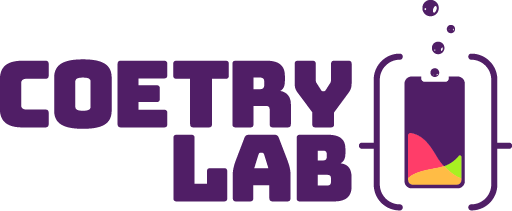
GENDER STI H2020 RIA Action

‘2020– 2023
GENDER STI – Gender equality in science, technology and innovation bilateral and multilateral dialogues
GENDER STI is a project co-funded by the European Union’s Horizon 2020 research and innovation programme under grant agreement No 872427.
Vision
- Gender STI aims to follow up on how gender equality matters are taken into consideration at different levels of international cooperation dialogues in the area of STI between the EU Member States and Associated Countries on one side, and the selected set of 10 third countries (Canada, the U.S., Mexico, Brazil, Chile, Argentina, South Africa, India, South Korea and China) on the other side.
- The project will work to develop a strategy to co-design solutions for common challenges regarding gender inequalities in STI through a design thinking process to engage relevant stakeholders in EU and the selected third countries.
Project Scope
- Type of action: Horizon 2020 Research and Innovation Action (RIA)
- Call: H2020-SwafS-2019-1
- Topic: SwafS-12-2019 The gender perspective of science, technology and innovation (STI) in dialogue with third countries
- Duration: 3 years
- Start date: 1 July 2020
Route 63
2020 – 2022
Towards a Better Understanding of the Cognitive and Affective
Mechanisms of Computer Programming and Computational Thinking
Involved institutions: KFU Graz, Institute of Psychology, TU Graz, Institute of Software Technology
–> Link
The PECC- Framework
In all of my initiatives for girls I hypnotised the following:
“Playful and creative coding activities strengthen the intrinsic motivation of female teenagers for programming.”
The “Playing, Engagement, Creativity, Creation” (PECC) framework builds the basis for all of my initiatives. The PECC framework is informed by key literature in gender studies, Computer Science education, and the learning sciences; iteratively developed through the large-scale European study (“No One Left Behind” NOLB Project, H2020 No. [645215]) and expanded from 2018-2020 to have a unique focus on gender consciousness by focusing on gender in CS classrooms.
Related Publications:
- Spieler, B. (2022): Gendersensible Gestaltung eines Computational-Thinking-Kurses mit Hilfe des PECC-Modells, In: R. Knackstedt, J. Sander, J. Kolomitchouk (Hrsg.) Kompetenzmodelle für den Digitalen Wandel: Orientierungshilfen und Anwendungsbeispiele, Springer-Verlag GmbH, Berlin, Germany
- B. Spieler, C. Girvan. 2020. Das PECC-Framework: Gender-Sensibilität und spielerische Programmierung in der informatischen Grundbildung. 18. Fachtagung Bildungstechnologien der GI Fachgruppe Bildungstechnologien (DELFI 2020). September 14-18, 2020.
- Spieler, and W. Slany, 2018. Game Development-Based Learning Experience: Gender Differences in Game Design, 12th European Conference on Games Based Learning. October 4-5, 2018, Sophia Antipolis, France. https://arxiv.org/abs/1805.04457
- Spieler and W. Slany, 2018. Female Teenagers and Coding: Create Gender Sensitive and Creative Learning Environments, In Proceedings of Constructionism 2018. August, 20-25, 2018, Vilnius, Lithuania. https://arxiv.org/abs/1805.04366
- Spieler, 2018. Reinforcing Gender Equality by Analysing Female Teenagers’ Performances in Coding Activities: A Lesson Learned. In Proceedings of Conference on Gender IT 2018 /GEWINN-Konferenz 2018. May, 24-35, 2018, Heilbronn, Germany. https://doi.org/10.1145/3196839.3196871
2019
IT Talenteschmiede (en. “talent forge”)

Purpose:
To increase the number of IT professionals/students with new teaching concepts, workshops, open learning spaces, evaluation of activities.
Consortium: TU Graz, University of Applied Science Graz, University of Graz.
Description:
Analyse/evaluate Pocket Code and other existing visual coding tools. Create teaching concepts and material for workshops. Evaluate tools and concepts during Girls Coding week, Maker Days, robotic courses, and other CS related courses.
Activities:
-
- Girls Coding Week at TU Graz: https://www.tugraz.at/sites/comaed/kurse/girls-coding-week/
- Girls Coding Week at Styria Council: https://www.sdc-styria.at/lernende/design-deine-eigene-app-mit-pocket-code/
- hAPPy-Lab: https://learninglab.tugraz.at/informatischegrundbildung/makerdays/materialsammlung/
- Maker Days: https://learninglab.tugraz.at/informatischegrundbildung/impulsvortrag-maker-days-for-kids-rueckblicke-und-ausblicke/
Related Publications:
-
-
(accepted) B. Spieler, F. Kemeny, K. Landerl, B. Binder, and W. Slany. 2020. The learning value of game design activities: Association between computational thinking and cognitive skills. In Proceedings of the The 15th Workshop in Primary and Secondary Computing Education (WiPSCE), October, 28 – 30, 2020, Essen, Germany (Online
-
(accepted) B. Spieler, M. Grandl, and V. Krinjic. 2020. The hAPPy-Lab: A Gender-Conscious Way To Learn Coding Basics in an Open Makerspace Setting. International Conference on Informatics in School: Situation, Evaluation, Problems, November 16-18, 2020, Tallinn, Estonia.
- (accepted) B. Spieler and F. Kemeny, 2020 Design, Complexity, and Coding: A Framework to Evaluate Mobile Coding Projects. 13th European Conference on Games Based Learning. Sep 24 – 25, 2020. Brighton, UK.
- Spieler, V. Krnjic, and W. Slany, 2019. Girls Create Games: Lessons Learned. 13th European Conference on Games Based Learning. October, 2-3 2019, Odense, Denmark. DOI: 10.34190/GBL.19.057, https://arxiv.org/submit/2765566
-
"The Magic Word
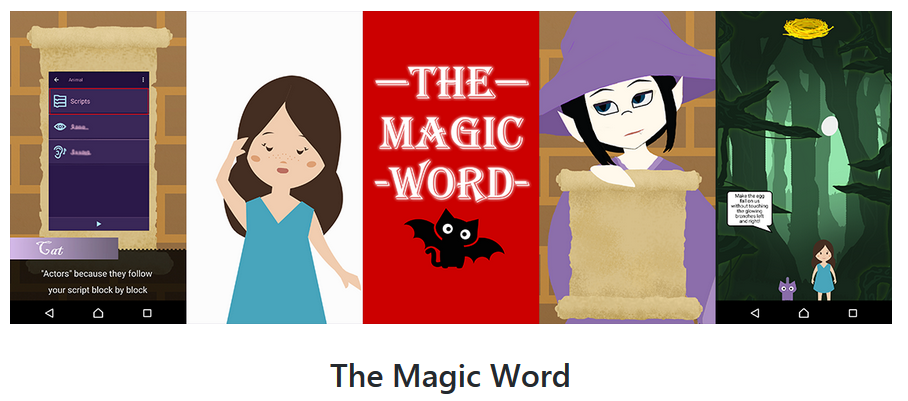
-
- Video tutorial game “The Magic Word”: https://youtu.be/4pGPNmvtfIM
- GitHub Repository for the Tutorial Game: https://github.com/Catrobat/LunaAndCatTutorialGame
- Projekt available (prototype): https://share.catrob.at/luna/project/e1374d34-d16d-11ea-a5c3-005056a36f47 – please download via Luna&Cat or Pocket Code
-
- Spieler, N. Pfaff, and W. Slany, 2020. Reducing Cognitive Load through the Worked Example Effect within a Serious Game Environment. Proceedings of the 6th International Conference of the Immersive Learning Research Network (iLRN). June 21–25, 2020, San Luis Obispo, California, USA.
- Spieler, N. Pfaff, S. Mak, and W. Slany, 2020. The Magic Word: A Coding Tutorial-Game to Engage Female Teenagers in App Design, In Proceedings of Constructionism 2020. May 26-29, 2020, Dublin, Ireland. p. 556 – 564. http://arxiv.org/abs/2003.01380
MOOC: Get FIT in Computer Science
This course should attract women in particular by counteracting stereotypes and clarifying expectations. The modules are all done by women! We are talking about famous female CS scientists and use a game design approach. These pre-MOOC should make it easier for prospective students of TU Graz to start their technical studies.
Available at iMooX.at. (in English/German)
Enroll now: https://imoox.at/mooc/go/Info-Fit19
Links:
- Design Your Own App Lecture at Uni Graz: http://developer.catrobat.org/appdesign.html
- MOOC on iMoox.at (in English): https://imoox.at/mooc/local/courseintro/views/startpage.php?id=71&lang=en
- All videos are also available on Youtube, see for example a video to promote female computer scientists: https://www.youtube.com/watch?v=NcTeNfZsDSY&t=37s
- Corresponding on-side lecture at TU Graz: https://online.tugraz.at/tug_online/pl/ui/$ctx/wbLv.wbShowLVDetail?pStpSpNr=225133&pSpracheNr=2&pMUISuche=FALSE
Related Publications:
- B. Spieler, M. Grandl, M. Ebner, and W. Slany, 2020. Bridging the Gap: A Computer Science Preparatory Online Course for First Semester Students. Electronic Journal of e-Learning (EJEL). vol. 18, no 3. pp.248‑260. DOI: 10.34190/EJEL.20.18.3.004
- B. Spieler, M. Grandl, M. Ebner, and W. Slany, 2019. “Computer Science for all”: Concepts to Engage Teenagers and Non-CS students in Technology. 13th European Conference on Games Based Learning. October 2-3, 2019, Odense, Denmark, DOI: 10.34190/GBL.19.057 https://arxiv.org/submit/2809888
"App-Flavouring": The Luna&Cat App

An evaluation of the attractiveness of Pocket Code showed that students were motivated by its ease of use and its appealing design; however, girls rated the app less enthusiastically. To appeal to female teenagers in particular, a tailored version of the app “Luna&Cat” has been developed. This customised version stands in contrast to the “one size fits all” solution Pocket Code, which may discourage certain user groups. For apps to have a higher chance to appeal to a specific target group, it is necessary to optimise their store listing on app stores, especially as we found that app stores are the most effective way to reach teenagers. For the new version, a focus group discussion was hosted. This discussion first brought insights about our target group and suggested names and designs for the new app; and second, allowed each student to make proposals for their desired games. This is important because most girls have the feeling that the games they play are not created for them. With this customised app, our aim is to reach and build a user base of interested female teenagers who want to learn how to code.
Download-Link: https://catrob.at/luna
Related Publications:
- Spieler and W. Slany, 2019. A Customised App to Attract Female Teenagers to Coding. Conference on Gender Research (ICGR 2019). April 11-12, 2019, Rom, Italy. https://arxiv.org/abs/1905.100
- Spieler and W. Slany, 2019. Intersectionality and Computer Science Education: Building Sensitivity and Awareness.18th Annual STS Conference Graz 2019. In STS Conference Graz- BoA 2019 Research. May 6-7, 2019, Graz, Austria
Code'n'Stitch
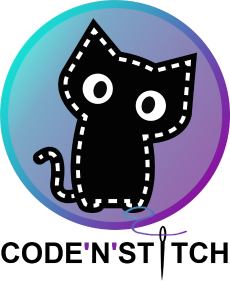
-
- (accepted) Spieler, V. Krnjic, W. Slany, K. Horneck and U. Neudorfer. 2020. Design, Code, Stitch, Wear, and Show It! Mobile Visual Pattern Design in School Contexts, Frontiers in Education (FIE). October, 21-24, 2020, Uppsala, Sweden.
- Spieler u. V. Krnjic, 2020. Kreative Aktivitäten mit Smartphones für einen fächerintegrativen Einsatz, GDM-Jahrestagung. 09-13. März 2020, Würzburg, Deutschland.
2018
RemoteMentor
-
- Akademisches Gymnasium: https://www.akademisches-graz.at/zusammenarbeit-mit-dem-institut-fuer-software-technologie/
- GIBS: http://www.gibs.at/programming-is-fun/ors or
- Discussing final results: https://www.youtube.com/watch?v=XzRtuYj-uSs&feature=youtu.be
-
- Project page (blog entries): https://www.netidee.at/remotementor
-
- B. Spieler, L. Oates-Indruchova & W. Slany. 2020. Female Teenagers in Computer Science Education: Understanding Stereotypes, Negative Impacts, and Positive Motivation. Journal of Women and Minorities in Science and Engineering. doi: 10.1615/JWomenMinorScienEng.2020028567 pre-print: https://arxiv.org/abs/1903.01190
- B. Spieler, J. Mikats, S. Valentin, L. Oates-Indruchova & W. Slany. 2020. “RemoteMentor” Evaluation of interactions between teenage girls, remote tutors, and coding activities in school lessons. In Proceedings of the 7th international conference on learning and collaboration technologies (LCT). 19-24 July, Online. Link
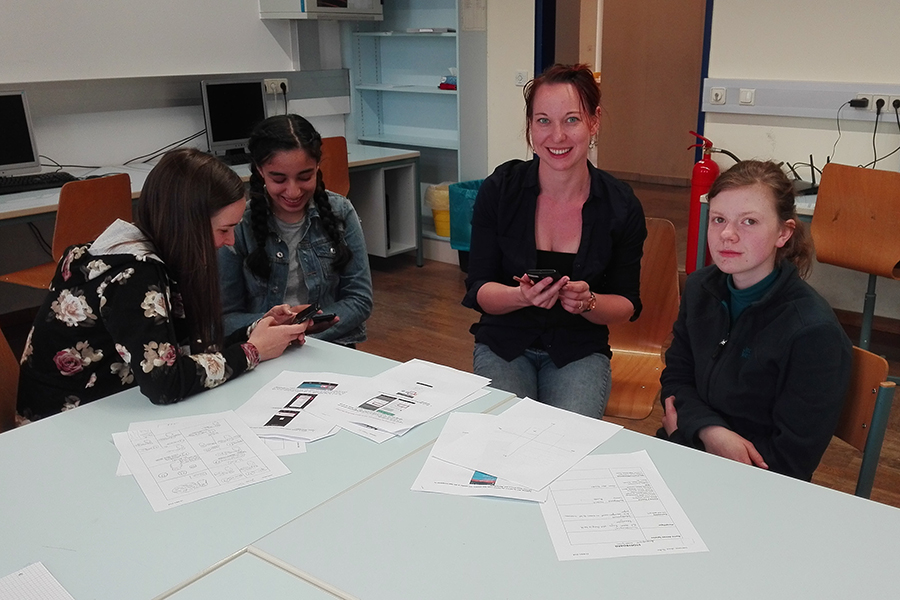
Catrobat Association

Links:
-
- Catrobat official page: https://catrobat.org
- Tutorials: https://pocketcode.org/hourOfCode
- Wiki: https://wiki.catrobat.org/
- Edu-Platform (NOLB): https://edu.catrob.at/no1leftbehind
- FOSS: http://developer.catrobat.org/
- GitHub: https://github.com/Catrobat
- JIRA: https://jira.catrob.at/
-
- Lodi, D. Malchiodi, M. Monga, A. Morpurgo, and B. Spieler, 2019. Constructionist Attempts at Supporting the Learning of Computer Programming: A Survey. Olympiads in Informatics, 2019, Vol. 13, 99–121.
- Slany, K., Luhana, M., Müller, C. Schindler, and B. Spieler, 2018. Rock Bottom, the World, the Sky: Catrobat, an Extremely Large-scale and Long-term Visual Coding Project Relying Purely on Smartphones, In Proceedings of Constructionism 2018. August 20-25, 2018, Vilnius, Lithuania.
- Lodi, D. Malchiodi, M. Monga, A. Morpurgo, and B. Spieler, 2018. Learning to program in a constructionist way, In Proceedings of Constructionism 2018. 20 – 25 August, 2018, Vilnius, Lithuania.
- A.M. Ayyal Awwad, C. Schindler, C., K. Kumar Luhana., Z. Ali, and B. Spieler, 2017. Improving Pocket Paint’s Usability via Material Design Compliance and Internationalization & Localization Support on Application Level. In Proceedings of the 19th International Conference on Human-Computer Interaction with Mobile Devices and Services. ACM, New York, NY, USA, Article 99, 8 pages. https://doi.org/10.1145/3098279.3122142.
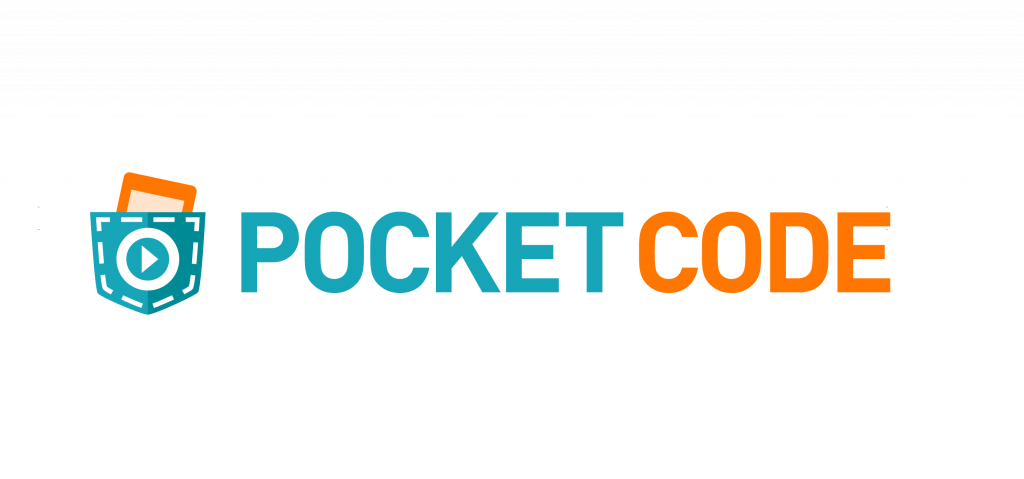
Links:
-
- Google Play: https://catrob.at/pc
- iTunes: https://catrob.at/pcIOs
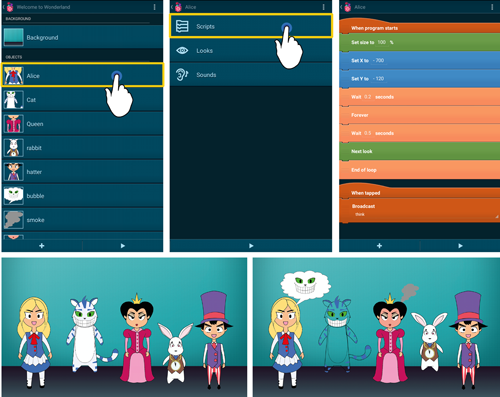
2015 - 2017
-
- Gaeta, M.E. Beltrán-Jaunsaras, G. Cea, B. Spieler, A. Burton, R.I. García-Betances, D. Brown, H. Boulton, and M.T. Arrendondo, 2019. Evaluation of the Create@School Game-Based Learning–Teaching Approach. Sensors – Open Access Journal 19(15):3251, doi: 10.3390/s19153251
- Spieler, C. Schindler, W. Slany, O. Mashinska, M.E. Beltràn, H. Boulton, and D. Brown, 2017. Evaluation of Game Templates to support Programming Activities in Schools. In Proceedings of the 11th European Conference on Games Based Learning. October 5-6, 2017, Graz, Austria. p. 600-609. https://arxiv.org/abs/1805.04517
- Spieler, C. Schindler, W. Slany, and O. Mashinska, 2017. App Creation in Schools for Different Curricula Subjects – Lessons Learned. In Proceedings of the 9th International Conference on Education and New Learning Technologies. July 3-5, 2017, Barcelona, Spain, p. 5814-5824. DOI: 10.21125/edulearn.2017 https://arxiv.org/abs/1805.04465
- Boulton, B. Spieler, C. Schindler, W. Slany, and M.E. Beltràn, 2016. The Role of Game Jams in developing Informal Learning of Computational Thinking: a Cross-European Case Study. In Proceedings of the 8th International Conference on Education and New Learning Technologies. Barcelona, Spain. July 4-6, 2016, p. 7034-7044. DOI: 10.21125/edulearn.2016. https://arxiv.org/abs/1805.04461
- Spieler, A. Petri, C. Schindler, W. Slany, M.E. Beltràn, and H. Boulton, 2016. Pocket Code: A Mobile App for Game Jams to facilitate Classroom Learning through Game Creation. In Proceedings of the 6th Irish Conference on game-Based Learning. September 1-2, 2016, Dublin, Ireland, p. 61-79. https://arxiv.org/abs/1805.04462
- Petri, C. Schindler, W. Slany, and B. Spieler, 2016. Game Design with Pocket Code: Providing a Constructionist Environment for Girls in the School Context. In Proceedings: Constructionism in Action 2016. February 1-5, 2016, Bangkok, Thailand, p. 109-116
- Petri, C. Schindler, W. Slany, and B. Spieler, 2015. Pocket Code Game Jams: a Constructionist Approach at Schools. In Proceedings of the 17th International Conference on Human-Computer Interaction with Mobile Devices and Services Adjunct. August 24-25, 2015. Copenhagen, Denmark, p. 1207-1211. http://dx.doi.org/10.1145/2786567.2801610
- E. Beltràn, Y. Ursa, A. Petri, C. Schindler, W. Slany, and B. Spieler, M.F Cabera-Umpierrez, M.T. Arredondo, and S. De Los Rios, 2015. Inclusive Gaming Creation by Design in Formal Learning Environments: ‘Girly-Girls’ User Group in No One Left Behind. In Design, User Experience, and Usability: Users and Interactions. Los Angeles, USA, Vol. 9187, p. 153-161. https://doi.org/10.1007/978-3-319-20898-5_15.

The Create@School app is a more tailored version of Pocket Code for academic purposes, with predefined templates for students to start with an almost finished game and accessibility settings have been added for students with special needs. Create@School is also linked to other services such as behavioral tracking to collect events during coding, as well as the Project Management Dashboard (PMD) for project submission and assessment by teachers. Create@School is still a beta version. For teachers please conduct createatschool@catrobat.org.
Download Link (Google Play): https://play.google.com/store/apps/details?id=org.catrobat.catroid.createatschool
